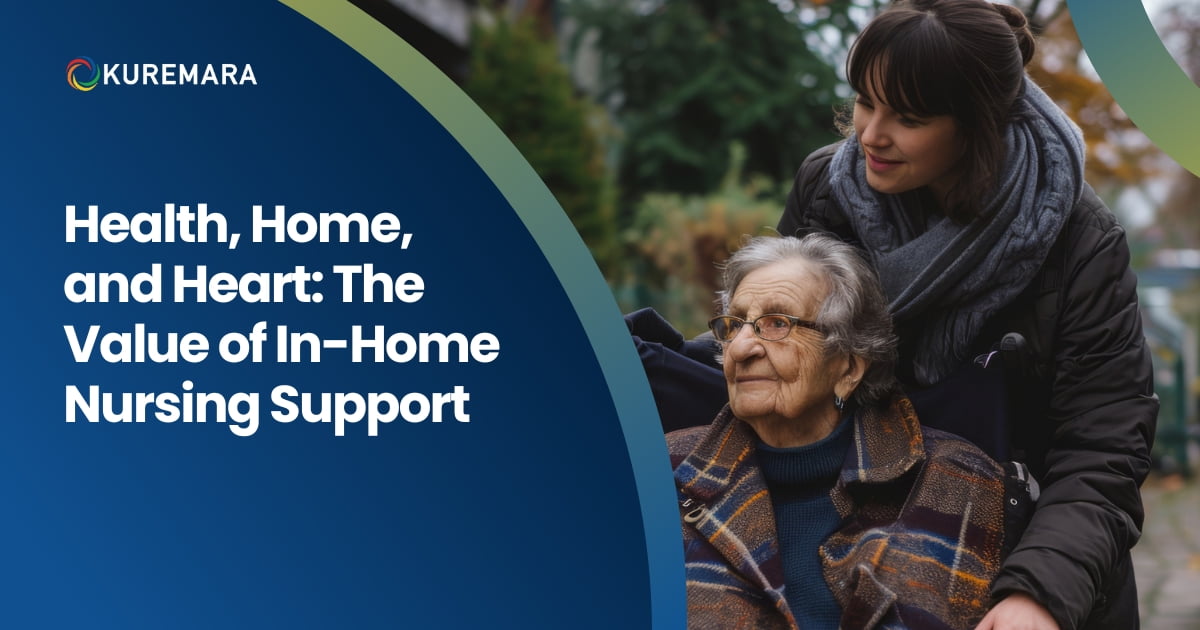
Introduction: Why Home Matters in Health
In the UK, the demand for personalised care delivered at home has been rising steadily. More than 483,000 people were supported in their community at home by local authorities in 2024, compared with around 132,500 in residential care homes and just 52,950 in nursing homes (GOV.UK, 2024). These figures highlight the growing shift toward in-home support as the preferred option for many families. For those looking beyond statistics, it’s about health, comfort, and dignity; the true value of in-home nursing care.
What Is In-Home Nursing Support?
In-home nursing care refers to clinical support provided by qualified nurses in a person’s own home. It differs from standard domiciliary care, which focuses mainly on personal assistance. In-home nursing involves:
- Medication administration and monitoring
- Wound care and catheter management
- Post-surgery rehabilitation
- Palliative and end-of-life care
This model aligns with the fact that the UK domiciliary care industry was worth about £11.5 billion in 2024, reflecting both the scale and importance of professional healthcare delivered outside traditional facilities (PolicyBee, 2024).
Advantages of In-Home Nursing Support

Choosing care at home brings benefits beyond convenience. The advantages of in-home nursing support include:
- Comfort and Familiarity – Staying at home, surrounded by personal belongings, can ease anxiety and support recovery.
- Tailored Attention – With one-to-one care, nurses adapt support plans specifically to the individual’s medical needs.
- Reduced Infection Risk – Compared with hospitals and care homes, being at home can lower the chance of contracting infections.
- Emotional Reassurance – Families gain peace of mind knowing that professional nursing support is delivered in the safest and most personal environment.
- Value for Money – For many, the costs of regular home visits can be lower than full residential care, particularly where only part-time clinical help is needed.
Comparing Options: Home Nursing Support vs Care Homes & Nursing Homes
Understanding the difference between care home and nursing home is key to making an informed decision.
- Care homes provide accommodation and assistance with daily living tasks but have limited clinical support.
- Nursing homes add 24-hour access to registered nurses for residents with high medical needs.
- In-home nursing support, meanwhile, enables many of the same services to be delivered in the comfort of one’s home.
Given that nearly one million people in the UK received publicly funded domiciliary care in 2024, it’s clear that home-based solutions are not just an alternative but the dominant form of support today.
Cost Considerations: Home vs Institutional Care
Cost is often a deciding factor. As of 2024, local authorities paid around £24 per hour for external home care providers, marking a 6.5% increase from the previous year (GOV.UK, 2024).
By contrast, the average cost of nursing home care in the UK was about £1,027 per week, while care homes without nursing averaged £888 per week for residents aged 65 and older. For families funding care privately, this gap becomes even more significant. NHS-funded nursing care contributions also rose in 2024, with the standard weekly rate per person set at £235.88.
These figures highlight why families are increasingly considering in-home nursing as a financially viable, dignified, and flexible option.
If you’re weighing up costs and options, explore our tailored pricing for live-in care, visiting nurse services, and other in-home support. We’re here to provide clear, transparent guidance so you can choose the right level of care with confidence.
Live-in Nursing Care vs Visiting Nursing Care
Families often weigh up whether live-in nursing care or visiting nursing care best suits their needs. Both options provide professional support, but they differ in structure, intensity, and cost.
- Visiting nursing care is arranged by the hour. Nurses come at scheduled times during the day or night to administer medication, provide wound care, monitor recovery after hospital discharge, or support with other clinical needs. This option is highly flexible and works well for those who need regular but not constant assistance.
Explore More Here: When a Little Help Goes a Long Way: The Power of Hourly Visiting Care
- Live-in nursing care involves a qualified nurse staying in the home around the clock, offering continuous support for complex or high-intensity needs such as advanced medical conditions, post-surgical rehabilitation, or palliative care. It provides peace of mind for families and ensures professional oversight at all times.
The choice depends on medical requirements, lifestyle preferences, and budget. Many families begin with visiting care following hospital discharge and later consider live-in support if needs become more intensive.
How to Choose the Right In-Home Nursing Care Provider

To find a trustworthy provider, consider:
- Regulation & Accreditation – Ensure the provider is CQC-registered and that nurses are on the Nursing & Midwifery Council (NMC) register.
- Clinical Expertise – Ask about experience with specific conditions such as cardiac recovery or palliative care.
- Cost Transparency – Confirm what is covered, and check if NHS or local authority support is available.
- Flexibility & Personalisation – A good provider adapts to the patient’s lifestyle rather than forcing a rigid schedule.
- Trust & Rapport – Read reviews, seek recommendations, and observe how well staff connect with the patient.
Future of In-Home Nursing in the UK
Policy and funding trends are leaning towards supporting people at home. For example, in 2023–24, delayed discharges from hospitals due to unavailable home or community support accounted for 45% of delays in patients staying longer than 14 days (CQC, 2024). This pressure has pushed healthcare leaders to expand and professionalise home nursing support.
As the UK population ages and costs of nursing homes continue to rise, in-home nursing will likely become even more central to how healthcare is delivered combining professional care with the priceless benefit of remaining at home.
Conclusion: Health, Home, and Heart
In-home nursing support bridges clinical expertise with the comforts of home, offering a balance between professional care, emotional wellbeing, and financial practicality. With more families choosing home care, and with government data confirming its growing role; it is clear that this model is not just an option but an essential part of the UK’s health and social care future.
When health needs meet the warmth of home and the compassion of skilled nursing, the result is a solution where health, home, and heart truly come together.
Ready to take the next step? Contact us today to discuss your needs and explore our flexible costs for live-in care, visiting nurse services, and other personalised home care solutions. Our team is here to help you find the right support at the right price.



